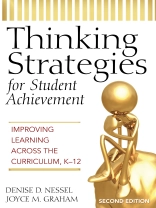‚This resource provides a repertoire of high-effect comprehension strategies. It is important for classroom teachers and school leaders to be able to justify why they are using specific strategies and what the benefits are of a specific strategy. Nessel and Graham provide this justification.‘
-W. Dorsey Hammond, Professor of Education
Salisbury University
Use these strategies to develop your students′ thinking skills and increase their learning in all subject areas.
How can teachers improve students′ higher level and creative thinking? The revised edition of this handbook provides strategies and sample lesson plans to help students learn to think more effectively and to raise their achievement levels.
Drawing upon past and recent research, the authors discuss the importance of actively engaging all students-including those with a history of low achievement-in higher levels of thinking. Thirty specific strategies, including K-W-L, Read and Think Math, and Reciprocal Teaching, can be readily integrated into daily lesson plans.
This step-by-step guide shows teachers how to:
- Help students develop, refine, and extend their thinking capacities
- Challenge students to creatively approach complex and unfamiliar material
- Encourage students to bring their own perspective to class assignments
- Provide students at all learning levels with appropriate support
With its user-friendly, practical approach, this important resource should be in the hands of every educator!
Inhaltsverzeichnis
Preface
Acknowledgments
About the Authors
Introduction: Thinking–Levels, Purposes, and Contexts
1. Analogies
2. Anticipation Guide
3. Carousel Brainstorming
4. Cloze Procedure
5. Cubing
6. Directed Reading-Thinking Activity (DRTA)
7. Facts and Inferences
8. Frayer Model for Concept Development
9. Freewriting
10. Games for Thinking
11. Graphic Organizers
12. I-Search Reporting
13. Imitation Writing
14. Jigsaw
15. Journals and Learning Logs
16. Key Word Notes
17. Key Word Prediction
18. KWL
19. List Group Label
20. Notetaking
21. Paraphrasing
22. Possible Sentences
23. Read and Think Math (RAT Math)
24. Read Talk Write
25. Readers′ Theater
26. Reciprocal Teaching
27. Saturation Reporting
28. Scrambled Words and Sentences
29. Think-Pair-Share
30. Writing Frames
Resource: Combining Strategies–Sample Lessons
Bibliography
Index
Über den Autor
Joyce M. Graham, Ph.D. is the Director of Professional Development for Scholastic RED, the professional development division of Scholastic, Inc. In this capacity, Joyce is responsible for recruiting and training consultants as well as developing and managing institutes and workshops. Before joining Scholastic, Joyce had her own educational consultant firm and worked with school districts across the country. She was a classroom teacher for over 15 years and brings her classroom experience to her work with teachers. Joyce has co-authored several books for classroom teachers. She has also served as editor for several books focusing on professional development.












